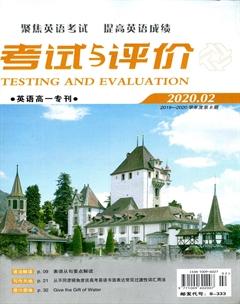必修3第3单元重点词语精讲精练
王振祥
1. scene n. (戏剧)一场;现场;场面;景色
scene为名词,有如下含义:
① 戏剧的一场 (a small part of a play)
The first act is divided into four scenes. 第一幕分成四场。
② (事件的)发生地点;现场 (the place where something happens)
Our reporter was the first person on the scene. 我们的记者是最先到达出事地点的。
③ 景色;景象 (view; something that you can look at)
The sunrise was a beautiful scene. 日出是一幅美景。
④ 布景;场景(background on the stage of a theatre)
The scene of the play is a kitchen. 这出戏的场景是厨房。
【思维拓展】
behind the scenes在后台;[喻]在幕后;知道内情的;appear / come on the scene出现在舞台上;登场;出场;[喻]受到人们注意;on the scene [口]出现;到场;在场;quit the scene退场;离开人间;set the scene (为……)作好准备;描述实况
【易混辨析】 sight, view, scene, scenery的区别
sight指“景色”,作可数名词时,往往指眼见的景色,如供人游览的“景”和“名胜”,但尤指人工制成的人文景觀。view, scene和scenery则往往指自然景色。view强调看到景色的整体印象,scene强调景色本身。而scenery一般指某一地区的自然风貌或乡村的天然景色,如高山、平原、峡谷、森林、草地等。
2. stare v. 凝视,盯着看
Why are you staring at me like that? 你为什么那样盯着我看?
They all stared with astonishment. 他们全都惊讶地瞪着眼。
He felt a little shy as the girl was staring him in the face. 他有点害羞,因为那个女孩紧盯着他脸看。
She stared him into silence. 她把他盯得不吭声了。
【思维拓展】
stare at sb. / sth. 凝视某人/某物;stare sb. in the face凝视着某人,紧盯着某人;stare sb. into sth. 瞪着某人使做出某种反应
【易混辨析】 stare, glare, glance和gaze的区别
stare表示一般意义上的盯着看,常指因生气、害怕或吃惊而睁大眼睛注视着某事物,常与at, into等介词连用;glare是“怒视”,表示愤怒地看;glance指快速地看某人或某物一眼;gaze表示“目不转睛地看”,并含有“惊叹”、“羡慕”或“入迷”的意思。
【要点提示】 stare也可用作名词,意为“凝视”。如:
She gave him a long cool stare. 她冷冷地久久凝视他。
3. fault n. 过错;缺点;故障
It was not our fault that we were late. 这次迟到不是我们的错。
Any fault in a car can cause the loss of lives. 汽车上的任何瑕疵都可能导致生命的损失。
【思维拓展】
at fault出差错;有毛病;是问题所在;find fault (with) 找茬,挑毛病;to a fault过于……;过头;过火
4. spot vt. 发现;认出 n. 斑点;污点;地点
He finally spotted just the shirt he wanted. 他最后找到了他想要的衬衫。
They were spotted by police as they were entering the bank. 他们走进银行时被警察认出来了。
There are several spots on my shirt. 我衬衫上有几处污点。
This is the spot where the two trucks crashed. 这儿就是两辆卡车相撞的地点。
5. account v. 认为;说明,总计有 n. 说明;理由;计算;账户
He put the money into his bank account. 他把钱存在他的银行账户上。
We can not account for his failure in the English examination. 我们无法解释他为什么在英语考试中未考好。
【思维拓展】
account to sb. for sth. 向某人解释某事;give an account of 解释(原因);keep account of记账;take account of考虑;记录;leave out of account没有考虑到,不计较;on account of因为,由于;on no account绝不,千万不要;on one's own account为了私利;责任自负;独自;account for对……作出解释;说明原因;take account of考虑;take... into account把……纳入考虑;顾及
6. seek v. 寻求;谋求;寻找;尝试,试图
Why don't you seek shelter from the rain? 你为什么不寻找避雨的地方呢?
You'd better seek the doctor's advice. 你最好征求医生的意见。
Mr. Zhao is seeking for a solution to the problem. 赵老师在寻找这个问题的解决方法。
【要点提示】
① seek是个不规则动词,其过去式和过去分词分别为sought, sought;
② seek可作及物动词,也可作不及物动词,应视情况而定;作不及物动词时,可构成词组:seek for sth. 寻找,寻求;seek out sth. 找到,找出;seek after sth. 追求,设法得到;seek into sth. 仔细检查。
③ 表示“试图;设法”,后面接动词不定式,不接动名词。
7. go ahead 前进;(用于祈使句)可以,往下说
A judge has ruled that the music festival can go ahead. 法官裁定音乐节可以继续进行。
You go ahead and we'll catch you up later. 你先走,我们一会儿去追你。
They've decided to go ahead with plans to build 50 new houses on the site. 他们决定继续实施在这片土地上建造50栋新房子的计划。
【思维拓展】
go along with赞成;支持;随行;go by时间过去;经过;遵守;go down下降;下沉;下跌;go in for从事;爱好;参加(竞赛、考试);go into研究;调查;从事;go off离开;爆炸;食品变坏;断电;go on继续进行;发生;go out离开;熄灭;过时;go over浏览;仔细查看;检查;审查;go through通过;经历(苦难);仔细检查;go up上升,增长;涨价;go wrong出毛病;发生故障,走错路
8. bring up vt. 抚养;培养;养育;提出;突然停下;吐出
bring up为及物的动词短语,后接人或动物时,意为“抚养;培养;养育”;后接事物时,有“提出”、“ 突然停下”、“吐出”等意思。如:
Many women still take career breaks to bring up children. 仍然有许多女性为了抚养孩子而离职。
I'll bring up this matter for my manager's consideration. 我将提出此事请经理考虑。
His remark brought me up short. 他的话使我语无伦次。
She was crying so much and I thought she'd bring up her breakfast. 她哭得太厉害了,我想她会把早饭吐出来的。
【思维拓展】
bring about引起;实现;使发生;bring down使下降;使倒下;bring in提出;引进;赚钱;bring out阐明;出版;使显出;bring back使回想起;给……带回
9. by accident 偶然;无意中;不小心
I deleted the file by accident. 我不小心删掉了那个文件。
I found her letter by accident as I was looking through my files. 我在查看我的文档时,意外地发现了她的信。
Did you leave his name out by accident or was it intentional? 你是无意漏掉了他的名字,还是故意删掉的?
【思维拓展】
by hand 手工;by mistake 错误的;by accident / chance 偶然;by turns 轮流;by law 根据法律;by day 在白天;by the day 按天计算;by the pound 论磅;by weight 按重量;by agreement 约好;by design故意地;by air / land / water 乘飞机 / 走陆路 / 走水路;by means of 用,依靠;by nature 天生的,生性;by heart 记牢;by mistake错误地,由于错误
10. on the contrary 相反,正相反,与此相反
The boy is not foolish. On the contrary, I think he is very clever. 这孩子不愚蠢,相反我认为他很聪明。
—You don't like football, do you? 你不喜欢足球,是吗?
—On the contrary, I like it very much. 恰恰相反,我很喜欢足球。
【易混辨析】 on the contrary与to the contrary的区别
两者都可表示“與此相反”,但前者强调说话者对前面所提出的情况完全不同意;而后者则仅指反面的情况。如:
I've never opposed it. On the contrary, I've always supported it. 我从未反对过它,恰恰相反,我一贯支持它。
I will come on Monday unless you write to the contrary. 我將于星期一来,除非你写信叫我别来。
另外,on the contrary通常用作状语,相当于副词;而 to the contrary则常用作定语,相当于形容词。
【巩固训练】
单项选择。
1. The little boy came riding full speed down the motorway on his bicycle. ___ it was!
A. What a dangerous scene
B. What dangerous a scene
C. How a dangerous scene
D. How dangerous the scene
2. Although she was ___ in a mountainous area, she is no less intelligent than townspeople.
A. grown up B. brought up
C. grown into D. brought out
3. No one likes ___; it makes you feel uncomfortable.
A. staring at B. being stared
C. staring D. being stared at
4. —I'm sorry to have kept you waiting. I was answering a phone.
—Oh, that's not your ___.
A. mistake B. cause
C. reason D. fault
5. The terrible accident occurred at a con- struction ___ where we paid a visit yesterday.
A. spot B. place C. site D. scene
6. —Jack can't concentrate on his lessons
recently.
—Yes, that might ___ why he did so badly in the last test.
A. answer for B. apply for
C. account for D. call for
7. Sometimes proper answers are not far to seek ___ food safety problem.
A. in B. to C. on D. after
8. He is such a man who is always ___ fault with other people.
A. putting B. seeking
C. finding D. looking for
9. David gave us a vivid ___ of his trip to Mount Tai after his return.
A. account B. explanation
C. imagination D. idea
10. —I probably shouldn't have any more cake.
—Oh, ___. It won't kill you.
A. go ahead B. hold on, please
C. you're welcome D. that'll do

